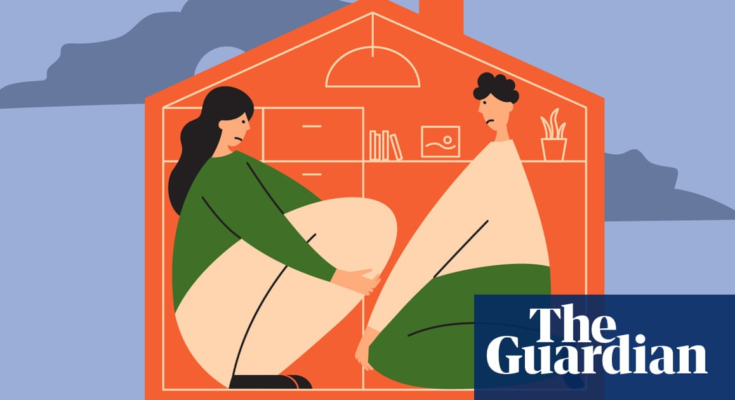For two years, the US has seen a home-buying frenzy – but once the ink dries on the property deeds, drawbacks zoom into focus
Wed 16 Mar 2022 06.00 EDT
Home ownership was initially a pandemic silver lining for Kay Kingsman, a travel blogger based in Portland, Oregon. After Covid-19 put an indefinite hold on her usual globe-trotting endeavors, she’d spent the better part of 16 months working her tech industry day job from the house she shared with several roommates, wishing she had more space to herself.
By last summer, a solution presented itself: her would-be travel budget had snowballed into a down payment’s worth of cash, while mortgage rates had dipped to record lows.
“It seemed like the stars were aligning,” says Kingsman, 28. But she knew she needed to act fast. After a whirlwind month of house hunting, she made an offer on a Portland townhome in late July; it was only the second property she saw in person. A week later, Kingsman closed the deal and paid her new home a visit. It was there that she felt her first twinges of buyer’s remorse.
The place wasn’t wrecked, exactly. “But it was so dirty,” Kingsman recalls. The sellers, who had vacated the property sooner than expected, hadn’t bothered to empty out the fridge or clean the stove; forensic evidence indicated that “they really liked oatmeal”. The carpeting stank of cat urine and had to be removed. Beard shavings littered the bathroom counters.
Filth was the least of her troubles. Kingsman soon uncovered a murky legal conflict between the home’s previous owners and the HOA (Homeowners Association), which had culminated in a lawsuit that she learned about only after moving in. She’d inherited the petty, interpersonal aftermath: nullified parking privileges and the unearned resentment of her neighbors.
This, it seemed, was her reward for persevering in a dog-eat-dog real estate market.
“I thought it would be a good investment,” she tells me. “And then the first mortgage payment hit, and I was like, ‘Oh no. I am trapped.’”
For the past two years, the US has seen a home-buying frenzy that goes beyond Zillow-scrolling sessions (a hobby meme-ified into cultural canon). Rocketing property values reflect the trend: data tells us the average American home was worth $249,000 in February 2020. Today, that figure is closer to $326,000 and projected to rise another 17.3% by next January.
The stakes are high for prospective buyers; the expectations, often less so. With good deals fewer and farther between, a mere accepted offer is a victory in itself. Yet some recent home buyers, like Kingsman, regret taking the plunge. The phenomenon has attracted a stream of media coverage, fueled in part by a growing body of surveys seeking to quantify disgruntled new homeowners’ rising discontent. But for anyone paying attention, the sentiment is tough to miss.
Real estate grievances are now a mainstay of online forums like r/homeowners on Reddit, where calls for commiseration are often phrased in question form and answered, in turn, by commenters’ consensus. “Anyone buy a money pit and regret it like I do?” reads one post’s header (the answer: yes). “How common is buyers remorse?” asks another (the answer: quite common).
These buyers’ predicaments began with the pandemic. “People were definitely eager to buy, and quickly,” says Martin Orefice, an Orlando, Florida, real estate investor and CEO of Rent To Own Labs. By the summer of 2020, Orefice’s business dramatically increased. But even more striking than the sudden influx of house-hunters was their collective urgency to lock down a property – any property.
“Instead of taking time to really shop around and make a decision, people were jumping on the first options available out of fear that someone else would take it,” Orefice says.
Their concern was understandable. Buyers’ demand for homes far exceeded the available supply, a shortage that predated the pandemic. Nonetheless, the shift was striking. Before 2020, Orefice had never seen so many homebuyers agree to high prices without at least attempting to negotiate first. He also noticed that many buyers hadn’t so much as visited the property in person before making an offer, an observation that turned out to reflect a broader national pattern: a Redfin survey found that 63% of homebuyers in 2020 made an offer “sight unseen”.
A year later, the landscape wasn’t much better. “The first house I saw, I was like, ‘oh, this is cute,’ says Kingsman. “It had just hit the market, and then it was gone the next day – someone made a cash offer. It was scary.”
Economists attribute the souped-up real estate market to a cluster of factors, including low interest rates and the geographic flexibility afforded by the white-collar shift to remote work. But beneath those market variables is another very real, if less quantifiable, catalyst: human behavior in the face of uncertainty.
“Buying a home gives people a sense of efficacy, taking charge of their lives and their futures,” says Dr Forrest Talley, a 20-year professor of psychology at the University of California-Davis who now operates a clinical practice in Folsom, California.
“Unfortunately,” Talley continues, “for some, this is the equivalent of taking charge of a commercial aircraft that is experiencing turbulence. Unless you are a trained pilot, it’s best to stay in your seat and wait out the storm.”
From a psychological perspective, in other words, it is less than ideal to make major life decisions when anxiety may be clouding your better judgment.
But to state the obvious, these are profoundly anxious times, and most people don’t have the luxury of putting their lives on indefinite hold in hopes of a passing storm. As we enter year three of a global pandemic – on top of rising inequality, climate crisis and, now, the emergence of war in Europe – there is clear appeal in a semblance of stability. When the future is capped with a question mark, it makes sense to want to shape it. And what’s more concrete and proactive than making a home of one’s own?
I’m as guilty as anyone of ogling fixer-uppers with purportedly good bones and a PO box in the middle of nowhere, indulging in a fantasy of myself that entertains company in an inviting living room, or throws a BBQ in my outdoor space.
But for those who take the plunge, once the ink has dried on the property deed, drawbacks zoom into focus. The aftermath can be difficult to live with – on a practical level, and emotionally.
“You invest so much hope and forward-looking feelings into a house,” says Heather Gates, 47. “When things go wrong with it, especially with the pandemic, it feels like the future is just kind of cut off from you.”
Last October, Gates and her husband finalized their purchase of an 1880 Victorian in the upstate New York town of Canajoharie, a roughly four-hour drive from their Brooklyn apartment. The house hadn’t been occupied in 40 years and needed some work before it would be habitable, but it was solidly built and had a beautiful yard; Gates envisioned the garden she would plant in the spring. Crucially, the house’s relative proximity to a train station would make it easier for the couple to travel to and from Brooklyn, where they planned on keeping their apartment as a pied-à-terre.
By the time I first spoke with Gates in mid-December, it was clear that the house was more of a fixer-upper than she’d bargained for. “I definitely went through a phase of genuinely hating it,” she told me, “but I’m on the other side of that now, I think? We were hoping to be moved in by now, so this can be frustrating.”
More than two months later, the house has become a physical extension of two years’ worth of uncertainty and helplessness. Repairs remain ongoing, without an end in sight. Gates and her husband have yet to move in.
“It feels very despairing,” says Gates. “Which is exactly the feeling that we were trying to escape from.” It seems that the garden will have to wait another year.
Across the country in the Pacific north-west, Kingsman is trying to make the most of her situation. She says she’s working to reclaim access to her parking spot through a baroque legal negotiation with her home’s previous owners (“Who I’m still mad at for not cleaning up their beard shavings,” she adds). And, bit by bit, she’s sprucing up the space.
“I’m doing the fun house stuff that you get to do, like paint the walls and put in new furniture,” says Kingsman. “So, that’s nice. But also, that money could have been spent in, like, Bali.”
{{topLeft}}
{{bottomLeft}}
{{topRight}}
{{bottomRight}}
{{/ticker}}
{{heading}}
{{#paragraphs}}
{{.}}
{{/paragraphs}}{{highlightedText}}
{{#choiceCards}}{{/choiceCards}}



